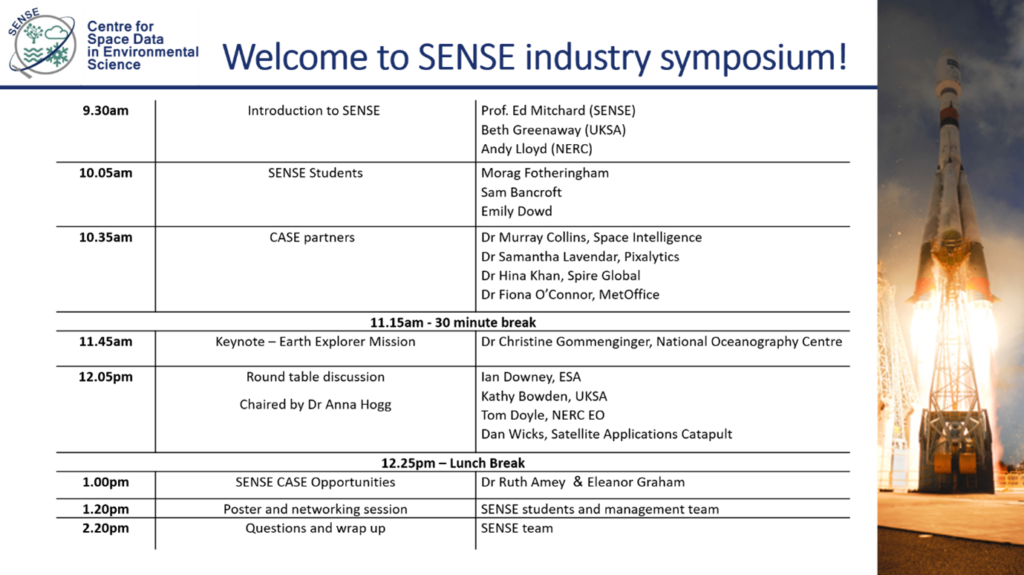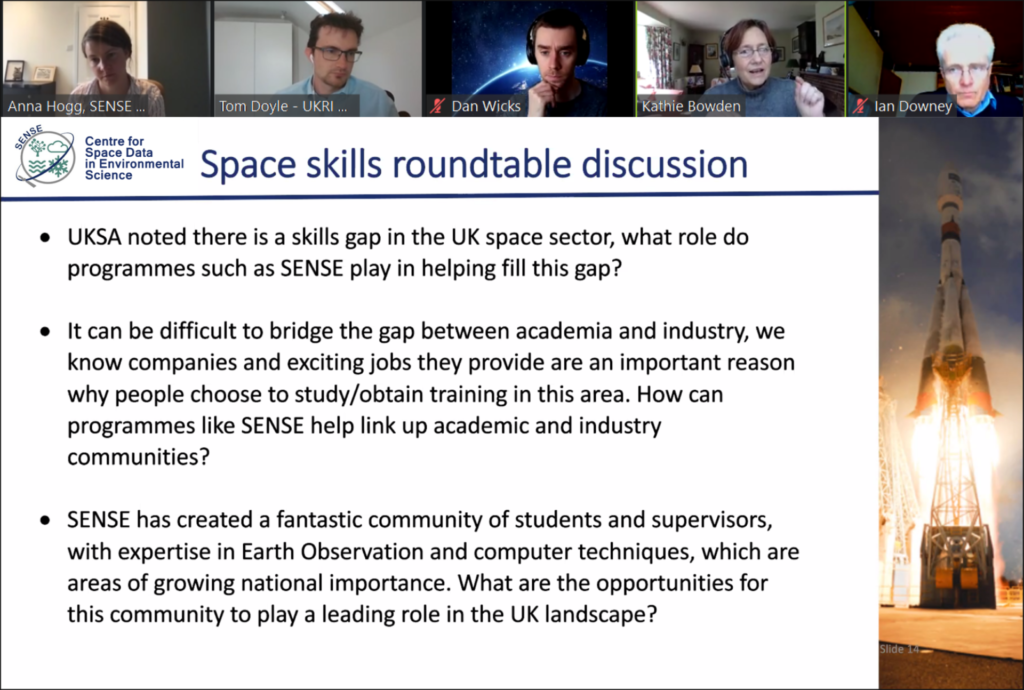Earlier this week SENSE held its first Industry Symposium. SENSE is really proud of its industry links, which give our students a network of industry professions as well as academics to aid their future careers, whether that be in academia, industry, the public sector, journalism and more.
Throughout the day the event had over 70 participants, with at least 40 participants from industry, including CASE partners, funders and government organisations.

Professor Ed Mitchard, SENSE co-director, introduced SENSE, which currently has 17 students with 15 more starting in October. These students cover broad topics – cryosphere, atmosphere, weather, space weather, vegetation, oceanography, ecology and crops – and use data from at least twenty types of Earth Observation satellites. Ed commented that all the SENSE students are using a common toolkit in terms of advanced data techniques, but the applications are very diverse. This is why SENSE is able to interact with such a wide range of industries.
SENSE is funded by NERC (Natural Environmental Research Council), which is matched by funding from University of Edinburgh and University of Leeds, and additionally from the UKSA (UK Space Agency). Beth Greenaway from UKSA laid out the UK’s vision to maximise the potential of Earth Observation by 2040. In order to maximise this potential, Beth noted that it’s essential to have people that understand the data and can use it to solve environmental problems – ‘if we’re going to have a thriving Earth Observation industry in the UK we need you to come and work in it!’. Andy Lloyd from NERC placed SENSE in the research council landscape, and explained that the call for SENSE’s funding arose because Earth Observation was identified a particular priority area that was not being addressed. Their skills gap survey showed that data is being underutilised and that the potential benefits were significant, with a barrier to this being the lack of trained people to use this data. Andy introduced CASE partnership, in which an industry can partner a particular project. This involves financial commitment (£1k per year), co-supervision and the student undertakes a 3-month internship during their 2nd year. ‘Through CASE partnerships we see mutual beneficial relationship. Putting in time and a small amount of funding, but also getting something back in terms of time and expertise from a really good student’.
In the next session, three students from SENSE’s first cohort presented their projects and their links to industry partners. Sam Bancroft commented that Unilever as a company is working on some similar topics to his project, and so there are lots of conversations that they can have and ideas that can move between them. Emily Dowd was looking forward to seeing how her collaboration with the MetOffice will pan out, and the benefits to both her PhD and the MetOffice in comparing models to understand which work better in different scenarios. Morag Fotheringham was looking forward to her placement with EarthWave, and thinking about which of their interesting projects she may be able to get involved with.
“After having worked in the UK Earth Observation sector prior to starting my project, I recognised the importance of an industry symposium. It was rewarding to engage with industry, share ideas, and be reminded of the usefulness of my work to those outside academia. As a result of today I hope to have opened lines of enquiry with partners in order to foster new collaborations and share data.”
– Sam Bancroft
Four of SENSE’s CASE partners gave introductions to their industry and how they work with SENSE. Murray Collins, who co-founded Space Intelligence, was looking forward to working with SENSE students and ‘getting brain power into the company, as well as shaping the brain power of the future’. Samantha Lavender who co-founded Pixalytics, spoke about her personal experience of choosing a PhD with a CASE partner because she felt it would benefit her future career, and that as an academic she saw the benefits of supervising students with CASE partners. For Sam, through CASE partnership Pixalytics can support the uptake and usage of Earth Observation data, and support the next generation while being involved in interesting science. Hina Khan from Spire, which has a fleet of over 125 nanosatellites built in Glasgow, reported how Spire is excited to work with SENSE because of its focus on Earth Observation and data anlyatics, which are two areas Spire at combining to enhance their capabilities. The MetOffice is the largest CASE partner of SENSE students and in Fiona O’Connor’s presentation she reported that the MetOffice are keen to be contributing to national capability, particularly fostering upcoming scientists and developing new expertise. Fiona is very pleased to have a CASE student starting in October this year, in a project with Ruth Doherty at Edinburgh.
Christine Gommenginger, who is the National Oceanography Centre representative on SENSE’s Management committee, presented in a keynote her experience as being a PI (principal investigator) on an Earth Explorer Mission. Becoming a satellite mission PI is the ultimate achievement in Earth Observation, and Christine wanted to pass a message to the current students ‘in the end we only regret we chances we didn’t take’. The process is long, competitive an uncertain, but with a good idea, a strong relationship between science and industry as well as passion, grit and luck, they could be mission PIs in the future.
At the roundtable discussion, Tom Doyle (NERC, digital environments senior programme manager), Dan Wicks (Head of Earth Observation at Satellite Applications Catapult), Kathie Bowden (UKSA lead on space skills and careers) and Ian Downey (ESA Space Solutions Business Applications UK Ambassador Platform) discussed space skills in the UK.

On the topic of the skills gap in the UK space sector, the UKSA Space Sector Skills Survey 2020: Research Report identifies the value of high-level training, because there will always be a need of people who have that extra level of knowledge and expertise, which Kathie feels is why SENSE’s connection between industry and academia is so powerful. Ian added the need for soft skills and rounded experience including entrepreneurship, project management and stakeholder relationship building, as well as technical excellence. On this note, Kathie shared her interest in ESA’s pilot scheme to bring in business students into programmes, to add different skills. Dan pointed out that the market is evolving rapidly and how essential it is to take the traditional knowledge of Earth Observation and put it in the context of the latest market status, to ensure the next generation of Earth Observation scientists are ready to play into this market – or even create the roles, Anna added. Tom shared that he thought SENSE has a role going forward to show the impact of these studentships to evidence the priority of similar training programmes in the future.
Discussing bridging the gap between academia and industry, Dan believes that it can be really difficult for a businesses to access expertise that sits in academia, and through formal collaboration with a programme such as SENSE students can be embedded within businesses to foster a more flexible, collaborative approach. Kathie feels that development of networks is key, and that SENSE’s networks and events like this industry symposium will become more and more important, and taking advantage of virtual events. Tom added that SENSE can have a key role in not only building but maintaining networks, which is a legacy that will continue. Ian often finds companies can have a 10 year old perspective on what space can offer, so he encourages collaborations with programmes like SENSE for aspiring companies to engage in this sector, as a low risk way to access the most current knowledge and expertise. Kathie discussed that industries often struggle to not only find skills they need, but also train their own people, which is a gap in which SENSE could potentially offer lectures or short courses, and Dan noted that in turn this could help drive research agendas.
To round up, Anna asked what are the opportunities for the fantastic community of students, academics and industry partners that SENSE have built up have, to play a leading role in the UK landscape. Ian shared that he was ‘thrilled to bits’ when SENSE was set up, with 50 new students coming through with the skill sets required to address national and global issues. Dan believes there is an increasing recognition within government of the role that space has to play in addressing many of its strategic interest, and Dan thinks that there are opportunities for SENSE to feed into this and drive the conversation. Kathie would like to see improved appreciation of the wide breadth of topics that ‘space’ covers – not just engineering and launching satellites – and instead of the ubiquitous nature of space data, and how it impacts daily life. Tom encouraged SENSE to make the most of space being really high on the political agenda, particularly on the environmental side.
For final advice for the students, Kathie urged them not to forget how transferable the skills that they are developing are, and to think about how they can use those skills in all sorts of different ways. Ian added that there is room for plenty more women in the space industry. Dan stressed to the students to not underestimate cross-disciplinary collaboration during a PhD, and to learn from others and take every opportunity to embed yourselves with those collaborations, whether it’s with industry partners or other sort of science disciplines, because that’s where that’s where the real sort of interesting kind innovations come from. Tom added they’re happy to link to other parts of UKRI.
Anna summarised that she felt it was fantastic to see what an important role SENSE and the SENSE students have in the development of national capability. It may be easy to forget when you’re a PhD researcher working on your own topic that you’re part of a bigger picture, and Anna is excited by the people involved in SENSE because they’re doing great things already, and can’t wait to see how they develop and how their careers pan out as we go forward.
After lunch, the students had a virtual poster session. This was held on the virtual platform ‘Remo’, where the students sat at ‘tables’ and shared their posters with anyone who came to sit at their table. For many this was their first opportunity to present their PhD, and many reported having useful and inspiring conversations.
Thanks to all who attended SENSE’s first industry symposium, we look forward to the next.
Are you an industry partner and would like to be involved with SENSE? Email Ruth Amey (eo_cdt@leeds.ac.uk) or Eleanor Graham (sense@ed.ac.uk) and we would be happy to discuss potential collabirations. As Ian Downey (ESA Space Solutions Business Applications UK Ambassador Platform) noted in the round table discussion, there are many companies from outside the traditional space domains, for example software systems and AI modelling, that are core to the space sector, and we would be really keen to engage with.



